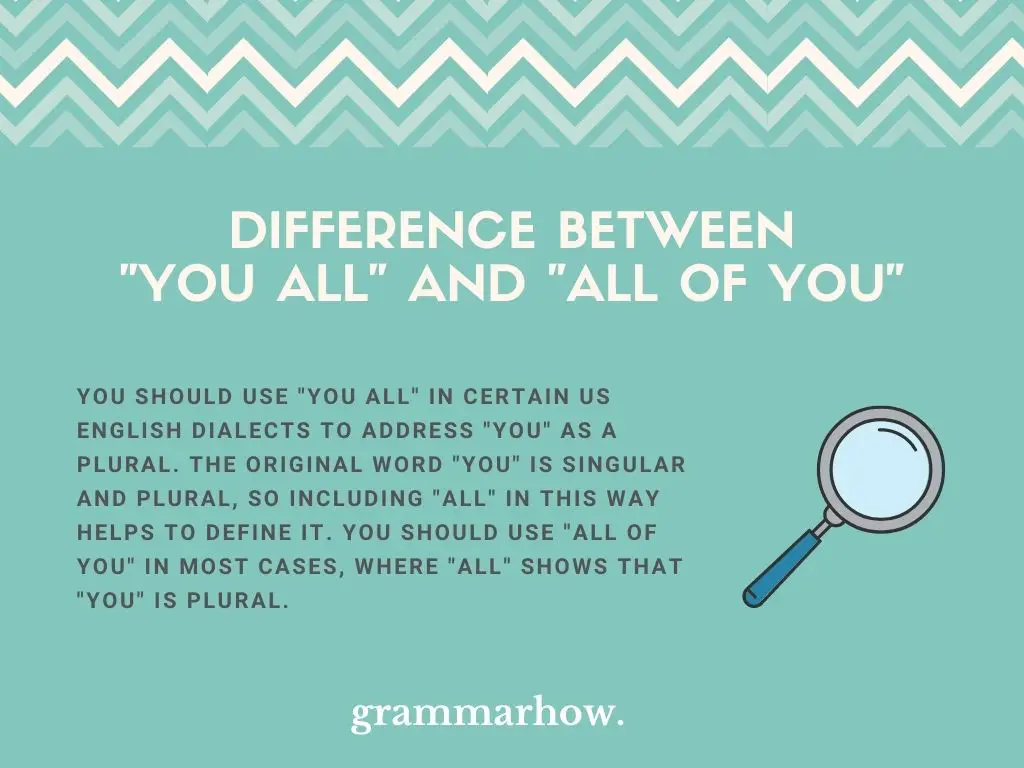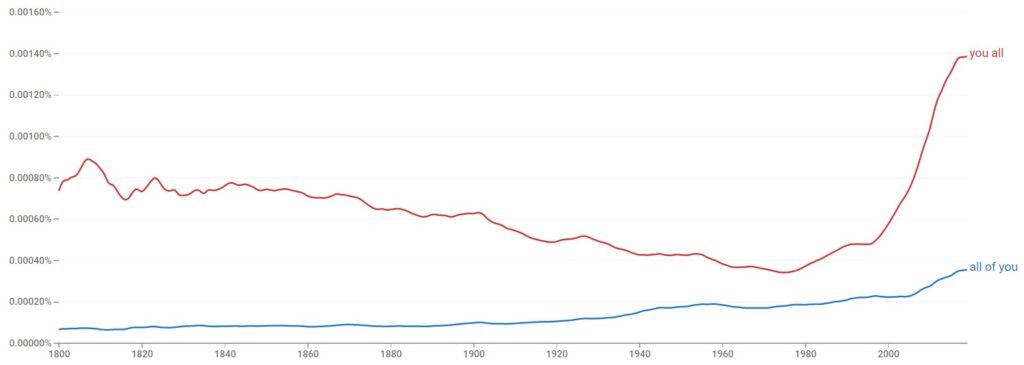The difference between “you all” and “all of you” is important to understand. While both forms work in certain situations, you’ll want to make sure you know the key differences before you try to use either of them in writing.
What Is The Difference Between “You All” And “All Of You”?
You should use “you all” in certain US English dialects to address “you” as a plural. The original word “you” is singular and plural, so including “all” in this way helps to define it. You should use “all of you” in most cases, where “all” shows that “you” is plural.

The problem with this phrase occurs when we look at how “you” works in English. We can show you the following examples:
- You need to get this done.
Generally, “you” refers to one person, and we’ll use it to direct our attention toward one person in particular. However, it’s also possible to use it when you’re talking to a group, in which “you” generalizes a group, thus making it a plural form.
Of course, understanding whether it’s singular or plural without further context clues is difficult. It’s even harder if you’re not a native speaker, which is why it’s common for people to include the word “all” to help to differentiate between the singular and plural forms.
- You all need to get this done.
- All of you need to get this done.
Both of these sentences mean the same as the previous one. The only difference is that we’re now making sure people understand we’re addressing a group of “you” rather than the singular “you.”
Is “You All” Or “All Of You” Used The Most?
Of the two phrases, it might help you to see which of them is more common to use. That way, you’re more likely to focus your learning on the one that most native English writers use.
According to Google Ngram Viewer, “you all” is the most popular choice and has grown exponentially over the last two decades. “All of you” has never been more popular than it but still gets used occasionally.

We can use this information to show that “you all” is more common. However, it’s mostly related to certain regions of the USA, where they contract the phrase to “y’all.”
Still, with the increasing prevalence of US English across other standard English-speaking countries, it’s no surprise that “you all” is becoming more common throughout the world.
Examples Of How To Use “You All” In A Sentence
Let’s go over some examples using the phrase “you all.” That way, you can see how you might make use of it in your own writing, and you can see how we can group people together with the plural form “you.”
- You all have given me great strength, and I’m so pleased to call you all my friends.
- You all need to get out of here before it’s too late.
- I’d like to thank you all for being there for me.
- If I had known you all before this, I’m sure we would have been the best of friends.
- I need you all to come to work tomorrow; otherwise, we’re going to be in a bit of trouble.
- You all should have known better than to do something like this without my guidance.
- I can’t think of a better way to deal with you all than by giving you a group punishment.
We can use “you all” to refer to “you” in the plural sense, meaning that we’re directing our statement to more than one person, but we’re in the same room with those people.
“You all” is actually a pronoun, just like “you” or “we” or “he.” We use it with the same grammar rules, where we usually need a subject, object, and verb for the pronoun to make sense.
Examples Of How To Use “All Of You” In A Sentence
“All of you” is synonymous with “you all,” but we mostly use it when we’re talking in other dialects besides certain US English ones.
- I need all of you to talk to me about what went wrong here so that we can work to make it better.
- All of you are in a great deal of trouble, and we’ll need to have a chat before the end of the shift today.
- All of you can report your findings to me once you’ve done your research.
- All of you should think long and hard about what you want to get out of this seminar and tell me about it before we leave the room.
- I need all of you to behave for a second and let me think about my next steps.
- Could all of you just be quiet? I need a second!
- It was a real pleasure meeting all of you, and I hope you’ll come and visit me again!
“All of you” is a phrase noun that we use to turn “you” into a more obvious plural form. It is not a pronoun but still follows the same rules because we’re using the word “you” as part of the phrase.
Incidentally, “all of you” is also considered the more formal option since it’s widely recognized globally rather than just in US English. If you’re addressing an entire workforce, it’s better to use “all of you” to do so.”
Is It “All Of You Is” Or “All Of You Are”?
Just because “all of you” is a phrase noun doesn’t mean it doesn’t have certain pronoun rules that need to be followed.
“All of you are” is correct because we use the pronoun “you” with it. “Are” is the correct verb choice of “to be” when we use the pronoun “you.” “All of you is” is never correct because it’s the wrong verb choice.
- Correct: All of you are getting on my nerves!
- Incorrect: All of you is making this hard for me.
“Are” is always the correct choice.
Is It Proper To Say “You All”?
“You all” is by far the most popular choice, and that was made clear from the graph we presented earlier. However, does that mean it’s proper to use it in writing?
“You all” is not proper to say because it’s not widely accepted across all English dialects and languages. It does not work well with formal writing, as it’s the incorrect way to address a group of people you’re talking to.
You should always use “all of you” when you’re trying to pluralize the pronoun “you” in a formal setting. It is the more proper of the two phrases, and is much more acceptable for all languages (including British English).
Should I Say Looking Forward To Meeting You All Or All Of You?
There are a few professional sayings you might use that include one of these phrases. It’ll help you to understand which of the two choices works best in a working scenario.
You should say “looking forward to meeting all of you” when you’re addressing people in a workplace. We might use it to address new employees, where we’re welcoming them to the company as a collective rather than individuals.
The same can be said when we use the verb “working.” Here are some examples to demonstrate:
- I’m looking forward to working with all of you.
- Working with all of you has been an absolute pleasure.
“All of you” is always correct with formal situations, and it’s especially appropriate in business emails or business meetings when you’re addressing a group of people you’re speaking to.
“You all” will only work formally when you’re in the correct regions of the USA to use it (namely Southeastern USA).
What Is The Difference Between “All Of You” And “Each Of You”?
We use “all of you” when we address the entire group of people that we’re speaking to. We use “each of you” when we’re separating the individuals within the group but not specifically naming any of them.
The two phrases are fairly interchangeable, and most people will use them in such a way. However, if you want to see an example of how they differ, you can see it in the following ways:
- All of you need to come with me now. (Every person in the room needs to go)
- Each of you needs to complete this task. (Each is singular, and every individual needs to do the task, but the whole group must do it)
Should I Use “You All” Or “Y’all?
“You all” and “y’all” are both correct. “Y’all” is a contraction of “you all,” where we cut out the “ou” portion of “you” and add an apostrophe. It’s most common in spoken US English, where people like to shorten their speech to streamline it.
“You All” And “All Of You” – Synonyms
Finally, let’s go over some synonyms you can use in place of “all of you” or “you all.” These are other ways that you can refer to a plural group of people that you’re addressing directly.
- Everyone here
- Each and every one of you
- You
- You lot
- You guys
You might also like: “All Of” or “All” – Proper Grammar Explained (With Examples)

Martin holds a Master’s degree in Finance and International Business. He has six years of experience in professional communication with clients, executives, and colleagues. Furthermore, he has teaching experience from Aarhus University. Martin has been featured as an expert in communication and teaching on Forbes and Shopify. Read more about Martin here.
